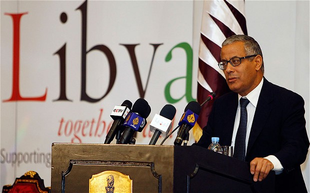The most effective and largest parties in Congress, the Justice and Construction Party (J&C;) and the National Forces Alliance (NFA) agreed to vote in the law without amendment.
Commenting on the decision, Ibrahim Gharyani, a member of the NFA, said his party had voted for the law because they wanted to put national interests first in order to solve the current crisis.
For his part, Nizar Kawan, a member of the J&C; party said this law had to include all people who were involved with Qaddafi’s regime, especially those who murdered, corrupted and destroyed political life in Libya since 1969.
The list of people who will be disbarred includes roughly 20 top echelons of civil and military administration.
In addition, the law will prohibit former officials from holding any position in government or even belonging to a political party. It will also ban them from leadership roles in the country’s state firms, such as the National Oil Corporation, as well as in the police and the military together with its universities and judicial bodies.
Five members of the Integrity Commission are be seconded within a month to form the committee to implement the standards of the Political Isolation Law.
The committee charged with implementing the law should start its work on 5 June 2013, the Libya Herald was told.
GNC spokesman Omar Hemidan said that Prime Minister Ali Zaidan could be among those disbarred, although it was still unclear. The matter would be decided by the committee charged with implementing the law.
Given that Zeidan does not fit any of the criteria for being banned, that seems unlikely. The Prime Minister served as a diplomat under Qaddafi’s regime and defected to the exiled opposition in 1980, not as an ambassador.
Ambassadors who served the regime are automatically disqualified from future employment with the government
(Source: Libya Herald)



